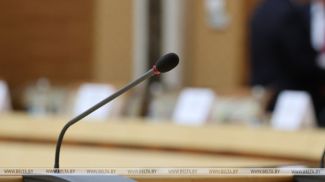MINSK, 4 January (BelTA) – A strategy designed to build up trust in the national currency in the period till 2035 has been adopted in Belarus, BelTA has learned.
Ways to bolster trust in the national currency
The government and the National Bank of the Republic of Belarus will pursue a coordinated policy to ensure the leading role of the Belarusian ruble in the domestic economy. Growing trust in the national currency will rely on stable prices and macroeconomic balance in the country.
The strategy reads that it may take some time to fully restore trust in the national currency.
A number of measures are supposed to be taken to catalyze faster growth of trust in the national currency and in the economic policy pursued by the government as a whole.
Measures to transition to inflation targeting are supposed to be fully implemented by 2021.
Efforts to considerably reduce monopolism in the economy will be stepped up within the next two to three years. Regional restrictions on merchandise trade inside the country will be fully scrapped.
Work will continue to increase the resilience of the state debt, which is primarily shaped by commitments in foreign currency (about 97%). Plans have been made to implement a strategy to reduce the state debt every year by limiting tied and untied government loans. The annual volume of the latter will not exceed 75% of the annual requirement for repaying the state debt.
The development of the financial market will rely on an updated strategy of development of Belarus' financial market.
The government and the central bank will promote the use of alternative forms of savings in a bid to procure long-term sources of funding in Belarusian rubles. Among other things the government will foster the development of collective investment institutions and the development of voluntary insurance relating to life insurance.
Plans are in place to regularly float government securities nominated in Belarusian rubles starting 2020 with various periods of maturity to target different kinds of investors. The securities will provide a reference point for the profitability of other medium-term and long-term financial market tools.
Measures will be taken in the real sector of the economy to rehabilitate state-run organizations. They will be built around rigorous financial discipline in relation to economically insolvent and ineffective enterprises. There are plans to hand over assets of economically insolvent organizations to more effective market players.
Broader use of the national currency
In line with the strategy a vigorous policy will be pursued to limit the functionality of foreign currencies in Belarus.
Work will continue to stop using foreign currencies inside the country. All rates of taxes, rental payments, tariffs, and prices of state-run organizations will be set in Belarusian rubles. All state payments, welfare benefits, and subsidies will use primarily Belarusian rubles.
Government agencies will be encouraged to specify sums in Belarusian rubles while talking about amounts of money relating to the Belarusian economy.
Apart from that, the possibility of amending the Belarusian-Russian intergovernmental agreement will be considered in order to rule out the possibility of foreign-currency transactions for natural gas between resident companies in Belarus.
The possibility of avoiding foreign-currency transactions between residents in insurance industry will be discussed. Exceptional usage of foreign currencies in Belarus will be regulated by a new revision of the law on foreign currency regulation and foreign currency oversight.
Hedging of foreign-currency risks
International practice indicates that hedging is one of the most popular tools for limiting and managing currency risks. It allows market players to work with the national currency regardless of the size of the currency risks they estimate.
Work continues in Belarus to form the legislative framework and infrastructure for deals with derivative securities for hedging currency risks. At the same time the current derivatives market is far from its traditional understanding.
Additional measures will be taken to spur the development of the hedging market.
A new infrastructure institution will be introduced. A repository will have to ensure the collection, systematization, analysis, and transparency of information about deals carried out on the over-the-counter market using securities and other financial tools.
End goals
Raising the share of the national currency in the broad money supply and the money lent by commercial banks and the Development Bank of the Republic of Belarus to the economy up to 80% will be used to measure the success of the strategy.
Keeping inflation below the target reference point will be important.











